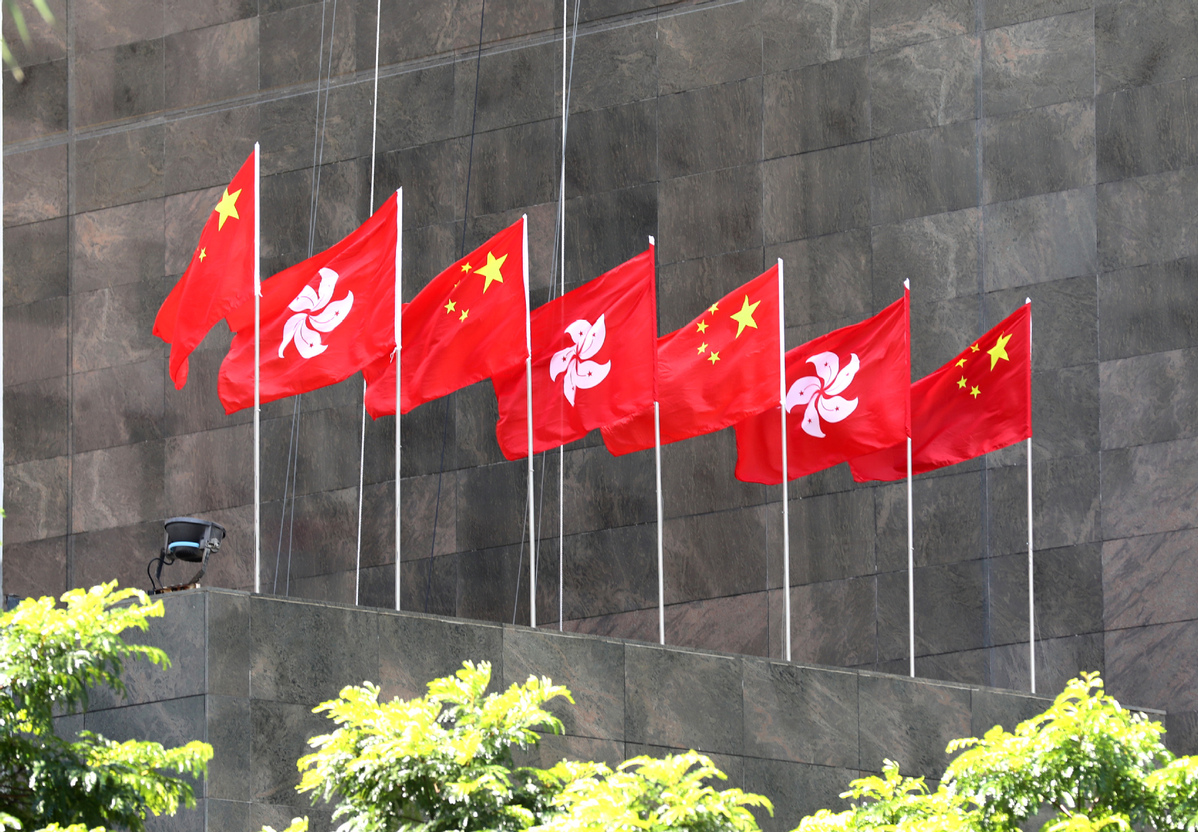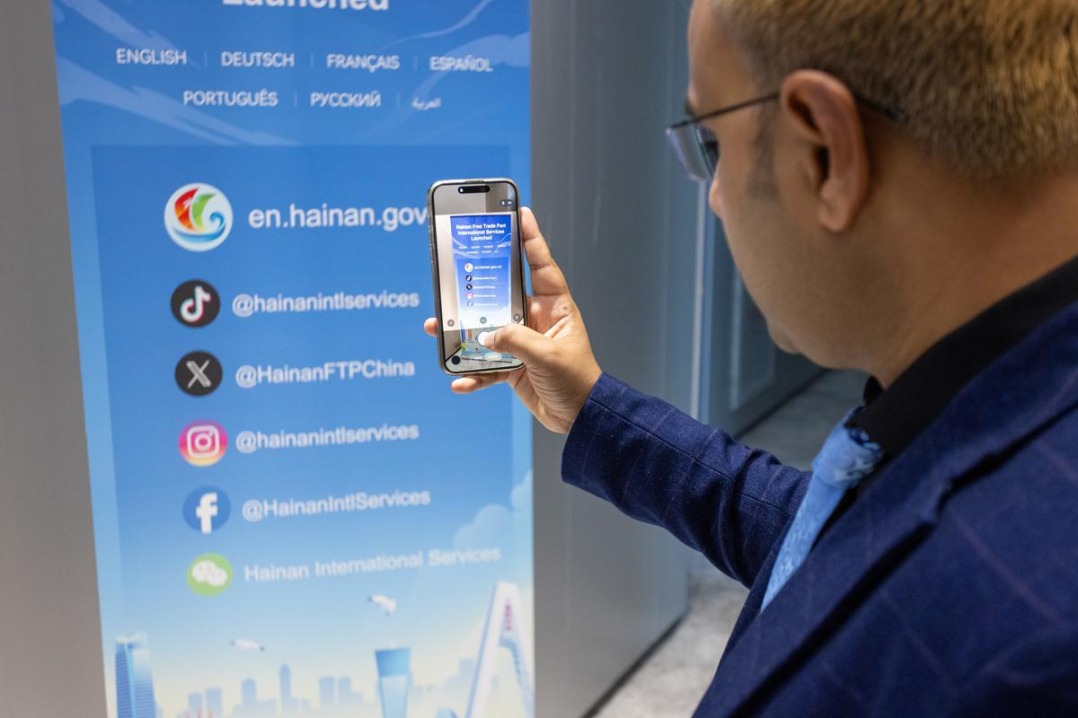Reporters Without Borders: Press freedom message compromised by political infiltration
By Grenville Cross | chinadaily.com.cn | Updated: 2022-07-24 13:21

After Hong Kong Watch was founded in the United Kingdom in 2017, as an anti-China propaganda outfit, it has, cancer-like, developed exponentially. Although its original focus was on Hong Kong, it is now engaged in a broader campaign against Beijing, and its techniques are illuminating. Once its creator, the serial fantasist, Benedict Rogers, has identified useful Sinophobes, like Chris Patten, Geoffrey Nice and David Alton, they are then appointed patrons, and deployed in various ways. At the same time, it has, while infiltrating existing entities, also established various front organizations.
One notorious example involved the All-Party Parliamentary Group on Hong Kong (APPG), which, in 2020, conducted an "inquiry" into alleged brutality by the police force during the insurrection of 2019. Although it claimed legitimacy, even aping due process, it was quickly exposed as a kangaroo court, with its officers having already prejudged the issues. With a Hong Kong Watch patron, David Alton, as its vice-chairman, it was covertly funded by "Stand with Hong Kong", a sinister anti-police grouping closely linked to Alton and Rogers, and, to nobody's surprise, its report duly savaged the police force.
When, moreover, the "Uyghur Tribunal" was established in 2021, with a self-imposed mandate to investigate the situation in the Xinjiang Uygur autonomous region, it was another phony. Although, like the APPG, it masqueraded as a formal inquiry, it was Hong Kong Watch that actually pulled the strings. One of its patrons, Geoffrey Nice, was insinuated into the chairmanship, and China was duly "convicted" of human rights violations. This was as expected, given Nice's ties not only to Rogers, but also to the notorious "China Tribunal", that he also chaired in 2019, and which adjudged China "guilty" of forced organ harvesting.
Of particular interest has been Hong Kong Watch's success in galvanizing anti-China sentiment in various parliaments, including Japan's. Its vehicle is the Inter-Parliamentary Alliance on China (IPAC), that was co-founded in 2020 by Hong Kong Watch Fellow, Luke de Pulford, now its Coordinator, and who was also active, behind the scenes, in Nice's "Uyghur Tribunal".
Just as Hong Kong Watch attracts interest by appointing patrons, so has IPAC appointed a galaxy of "co-chairs". They include the likes of US Senator Marco Rubio, who, despite their convictions for crimes of violence, nominated three Hong Kong protest leaders for the Nobel Peace Prize, and the UK's Baroness Helena Kennedy, who served on Nice's second tribunal. In return, these co-chairs are expected to support initiatives espoused by Hong Kong Watch, including, for example, the cancellation of extradition treaties with China, and the enactment of "Magnistky"-style laws for the sanctioning of China's officials.
However, notwithstanding Hong Kong Watch's nefarious activities, Hong Kong has, to its evident chagrin, bounced back from the social disorder. Although Hong Kong Watch provides a rallying point for malcontents and disseminates fake news, its attempts to harm China by undermining the city have failed.
Indeed, the Fraser Institute rated Hong Kong as the world's freest economy in 2021, and the World Bank's Governance Indicators rated Hong Kong as second in Asia in terms of the rule of law. And whereas the World Competitiveness Yearbook 2022 ranked Hong Kong as fifth in the annual ranking of the world's most competitive economies, based on its policies and focus on sustainability, the Queen Mary University of London's International Arbitration Survey rated it as the world's third-most preferred location for arbitration.
These global acknowledgments would, of course, have been impossible if Hong Kong had not successfully resolved its insurrection-related problems, and got itself back on track. However, its antagonists have not given up, seeking new methods of harming it, and this is where the Paris-based Reporters Without Borders ("RWB") has now come in handy. In its 2022 World Press Freedom Index, published on May 3, RWB ranked Hong Kong 148th out of the 180 countries and regions surveyed for press freedom, down from 80th in 2021 and 18th in 2002. It was identified, to Rogers' delight, as a place with a "difficult" press freedom situation.
Although, as RWB acknowledged, the National Security Law for Hong Kong (2020) enshrines "freedom of speech, of the press and of publication", it complained of its "ambiguous phrasing". This, it said, means that the new law "could apply to any journalist covering Hong Kong, regardless of their location". It then pointed to the closure of several media operations, including Apple Daily and Stand News, with the Hong Kong Journalists Association also weighing in to say the poor ranking reflected the turmoil that had recently engulfed the city.
Although it is certainly true that some media organizations have shut up shop, RWB failed to provide a proper, or, indeed, any context for this. In any civilized society, as it presumably realizes, there needs to be responsible reporting of news, and, if this is abused, there will inevitably be consequences. If, as happened in Hong Kong, certain newspapers deliberately report fake news, in order to promote their own political agendas, or sensationalize particular events, to stoke a public reaction, or seek to destabilize the city, by soliciting foreign interference, red lines are crossed. Nobody, however, reading the RWB's report would have been aware of any of this, or of the problems such activities occasioned.
In recent times, Hong Kong Watch, recognizing its propaganda value, has cozied up to RWB, using it to open up a new front against Hong Kong. It has carefully cultivated RWB's Azzurra Moores, who is described as "a human rights and press freedom advocate, working as the UK Campaign Officer for Reporters Without Borders". For her part, Moores, an eager neophyte, has fallen headlong into the trap Rogers laid for her. In consequence, it now appears that, just as it covertly influences IPAC, Hong Kong Watch is now also able to contaminate RWB's reporting.
Indeed, on April 26, when Hong Kong Watch convened a meeting in Westminster for the release of its own research report on press freedom, authored by Rogers, he had Moores on hand. She dutifully declared that press freedom had fallen in Hong Kong, and, for good measure, even called on the UK to join with other countries in imposing sanctions on the city. This was extraordinary, as it was only a week before RWB was scheduled to issue its latest Index, and it revealed inherent bias towards Hong Kong. Although it is unclear if Moores was on a frolic of her own or was reflecting official RWB policy, she certainly delighted Rogers, who decided to take things to a new level. On July 11, at London's Freedom House, the pair co-chaired a meeting on press freedom in Hong Kong, with each representing their respective organizations.
The event, however, was something of a damp squib, given that its participants all held identical views. There were only two guests, one being Steve Vines, the journalist who ran away from Hong Kong in 2021 and now spends his days denigrating China for anybody who will make it worth his while, and the other Nathan Law Kwun-chung, the fugitive self-publicist who, although a Rogers "hero", remains incapable of stringing two sentences together. Given their unanimity on everything, the audience was denied any stimulating exchanges, even though there was one telltale moment.
Although unrelated to press freedom, Moores seized an opportunity to malign Michelle Bachelet, the United Nations High Commissioner for Human Rights. She found it deplorable that, after her recent visit to China, Bachelet, the ex-President of Chile, had not condemned its treatment of the Uyghur population in the Xinjiang region. This, of course, was music to the ears of Rogers and Vines, who eagerly agreed, with Vines even suggesting that Bachelet hoped to become the next UN Secretary General. It did not, of course, occur to any of them that the reason Bachelet had not criticized China was that, having herself visited Xinjiang and been fully briefed, she realized that the situation was far removed from the scenario so beloved of the West's anti-China propaganda machine.
If RWB is genuinely interested in promoting press freedom in Hong Kong and elsewhere, it should clearly start by undertaking balanced assessments, and not allowing itself to be taken advantage of by unscrupulous actors. Although the extent to which Moores' grandstanding was authorized by RWB is unclear, it hopefully realizes that its message is lost when its frontline operatives are manipulated by the likes of Hong Kong Watch. If RWB truly wants to uphold press freedom, it should be promoting the unequivocal message that the best way of securing it is for media organizations to use it responsibly.
Grenville Cross is a senior counsel and law professor, and was previously the Director of Public Prosecutions of the Hong Kong Special Administrative Region. The views do not necessarily reflect those of China Daily.
- Reality Check: Falsehoods in US perceptions of China
- Assange case rips West's cloak of 'freedom': China Daily editorial
- Experts rebut US claims about Xinjiang rights
- Musk closes $44b deal to buy Twitter
- Anti-China disinformation -- Washington's geopolitical weapon under pretext of so-called "press freedom"























